
Mohammad Moniruzzaman
Researcher, Lecturer
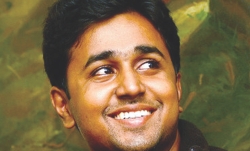 |
|
Photo:Courtesy |
A wise scientist once said, "Try not to become a man of success but a man of value." Mohammad Moniruzzaman, a man of both value and success is not just an example for the new generation. He is also someone who has proven himself to be one of Bangladesh's youngest achievers. Monir's academic life speaks for half of his achievements. A student of Microbiology, Monir secured first class first position in the Master's programme at Dhaka University. His yearning for knowledge, the need to know more about the dynamics of microbiology led him to pursue a PhD degree at quite an early age from the University of Tennessee, Knoxville, USA, with a research interest in Microbial Ecology.
For Monir, it was not just a singular agent that inspired him to study this subject. Rather, there were several motivating factors behind his interest in Microbiology. Since high school, he started growing a certain kind of liking towards biology. It was evident because his notebooks were often filled with sketches of biological specimen and on top of that he was always intrigued by the idea of dissecting worms, cockroaches and toads during lab classes. Monir's fear of traditional routine bound jobs further pushed him towards a career in the field of Biology. It allowed him to gain an insight about the lore of nature through extensive independent research.
Along with his academic and research plans, Monir wants to pursue a lifelong independent career in visual media. Bangladeshis have a lot of stories to tell. Monir wants to be one of the raconteurs sharing those tales. Currently, he is also taking photography as a serious hobby, but he plans to take it up a notch higher by searching other areas of audio-visual communication. Even though he does not have any plans in mind right now, he is confident that it will lead him to a whole new world of adventure.
Monir's struggles to achieve his goals were comparatively less. The only difficulty he initially faced was when he had to juggle between tutoring and practicing photography and at the same time studying a challenging subject like Biology. However, both these activities provided food for soul and survival. His friends and teachers were always very supportive of him.
Monir is optimistic about the new generation. He has faith in the youngsters of today and is positive about the fact that despite everything negative we know about the current Bangladesh, this country is still growing. People of Bangladesh have this strange resilience, which keeps urging them to work harder, resisting whatever obstacle comes their way. In his opinion, the political situation will worsen, and a point will come when the mass will turn back and fight to restore sanity. Except for a small fraction, most people have already lost their faith in political parties and are trying to improve their lives on their own. Bangladesh is already an important player in global events and a country of interest to many nations who will continue to invest and create opportunities for the increasingly efficient manpower that the country has. Having made such severe remarks, Monir with a pinch of irony is certain that we can do better as a nation, because our situation can't get any worse than it already is. The only thing he hopes for to do better as a combined force, as a nation, just as the saying goes, every cloud does have a silver lining.
By Sumaiya Ahsan Bushra
Prasanta Mridha
Writer
Prasanta Mridha studied in Jahangirnagar University and obtained his Bachelors and Masters Degrees in Bangla. Despite some social and political issues, Prasanta had spent a pleasant university life. From there he started trying out for the job market. "I had first worked in an ad firm for a while and then a newspaper office. Now, I am currently a teacher of a Government College," says Prasanta.
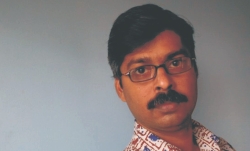 |
|
Photo:Courtesy |
Prasanta started writing at the age of sixteen. He has written short stories and many more since then. "My family was my inspiration-- My mother, father and also my friends. But my main source of inspiration was my grandmother. When I was young, my grandmother used to read me a lot of stories. Listening and growing up with these stories really made me understand the art behind writing. I wanted people to feel the same way I had felt when I read or heard those stories," says Prasanta.
In this fast pacing world, Prasanta talks about the challenges writers might or do face. He says, "A writer's life is like a marathon. We have to keep up with the rest of the world, which is moving at a very fast pace. I have been writing for about twenty two years now and I realise that as a writer, you most definitely have to keep up with the thoughts of the rest of the world for them to be able to understand you. "
Prasanta hopes to make a change in Bangladesh. Apart from all that he has already contributed to the growth of this country, he still has more plans. "Since the world is moving fast and new things are happening everyday, I would like to make sure that my writing really portrays the situations of the present and makes the current affairs of the world obvious to all my readers. They may read my writings just as stories, but when my readers start finding hope in my writings, that is when I will know that I have achieved something." says Prasanta.
Prasanta also dreams for Bangladesh, but with the facts and the situations that we have to face on a daily basis, he is more scared than hopeful. "As generations are going by, everyone is getting detached from the world. Nobody seems to be there for one another anymore. If this goes on, I think Bangladesh will fall into a pit -- deeper and darker -- until the government steps up to help," he says.
By Naziba Basher
Anik Khan
Author, Researcher & Entrepreneur
There are very few people on earth who have the power to make one laugh. Anik Khan is one amongst those rare talents, who can really make someone laugh until they are in tears. Humorous in nature, Khan's youth was spent in multiple schools. He always enjoyed writing more than reading, more so one was likely to find him writing hundred lines, as a punishment, for not reading what he was supposed to. As a result, Khan started writing professionally for the UNMAD magazine at the age of 16 and his first book came out when he was 18. Being an achiever at a young age, Khan decided to opt for his Bachelors at Shanto Mariam University of Creative Technology in Graphics Design and Multimedia. He also, attended an Advanced Diploma course in Communication Design at Billy Blue School of Graphic Arts, Sydney, Australia.
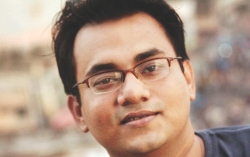 |
|
Photo:Courtesy |
For Khan, it was he himself and globalisation that worked as inspirations. He always dreamt to create promotion and advertising ideas of international standard for products and services here at home. In a nutshell- to sell minipack fairness cream to mini-wallet holders of Bangladesh with mini-nutrition for those who cannot even afford three meals a day. Now Khan only has the certificates, not the dream. No regrets though, but he is still truly grateful to his parents for letting him chase the dream that he once had and not forcing him to study CSE, IT or Business Administration just because it warranted a more socially accepted profession.
As a young writer Khan never faced any special hurdle except for the regular dog-eat-dog process but it only added spice to his life. However, as an entrepreneur, he finds no end to difficulties now.
Speaking of innovations, Khan says, that statistically it has been proven that his 'SMS Kabbo', a form of text message poetry, containing poems of 4 to 6 lines within 160 characters have helped some young people around the nation in practicing creativity. In 'SMS Kabbo' Khan has tried to simplify his thoughts and convictions about love and friendship, politics and society and other topics into poetry. The youth of Bangladesh has aided him by amplifying them through subscription, circulation and downloading them as ringback tones in their cell phones. Khan's sense of humour states that he has received ample amount of complaints from young people around the country saying that this facility only makes mobile operators richer, but in reality Khan states that it makes Bangladeshi writers like him richer. Thereby, in the process, his Bangla poems will enable him to snatch away a space of Hindu or Urdu songs. For Khan this is where the real victory is!
Modesty and hard work are highlighted words in Khan's dictionary, through his monthly publication TOBUO, he and his team has managed to make seven thousand households read again. As the US President Abe Lincoln once said that "Liberty is an unfinished business," Khan always believed in it and thinks that his work is his weapon and it is his liberation war of 2012, which is an unfinished business of 1971.
Khan believes in the importance of technology. No matter what some people or institute say or how they attack, he plans to continue his work to make sure that this generation understands that technology is not a foe neither is a friend. It is just a tool and we have to make use of it. The youth must be aware in order to 'fix' things around us both in political and social context.
In the next 10 years, according to Khan, it is just two governments away. He sees Bangladesh as a nation where democracy is still in practice, lead by politicians not by non-political self proclaimed leaders. Khan anticipates and is waiting for the aware youth of Bangladesh to come into action! He believes they will make the politicians practice good politics and journalists, good journalism, businessmen, fair business and so on and so forth!
By Sumaiya Ahsan Bushra
Mahbub Morshed
Writer
Hailing from the district of Rangpur, 34-year-old Mahbub Morshed works as a journalist for one of the leading Bengali dailies in the country. Once at home, Morshed uses the journalistic approach to write short stories about the issues of the middle class in Bangladesh.
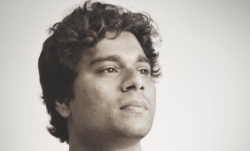 |
|
Photo:Courtesy |
Describing himself as a contemporary fiction writer with a keen interest in the history of literature and its aesthetics, Morshed had a knack for writing from a very young age. “It was probably at the age of 10 when I wrote my first piece, it was just a few random lines that came to my mind and I just felt like jotting them down,” he says.
Morshed entered the writer's arena in 2006 with a short-story collection entitled "Baktigoto Bosontodin" or "Personal Spring Days". The book which came out during the Ekushey Boi Mela was based on the ups and downs of the lives of the people in the country. “It would have been amazing if I could have chosen writing as a career, but unfortunately I cannot afford to do that,” he says.
He claims that writers in Bangladesh have a long road ahead and also criticises the initiatives taken by the government to promote writers, terming them impractical. “I do not think initiatives for writers can be taken under the current political condition,” he says. On the other hand, educational institutes and the media, according to Morshed, can create a huge difference for writers. “Television channels and newspapers should help writers by promoting their work.”
With a wide array of influences, ranging from Syed Shamsul Haque to Anton Chekov, Morshed believes that a new generation of Bangladeshi writers is around the corner and waiting to burst into the writing scene. He hopes that the upcoming writers pen more books in the tune of contemporary life and living.
When asked about his future plans, Morshed like a true journalist keeps it simple, “I want to continue the writing process: read, observe, celebrate and express myself freely.” One hopes that Morshed can use his journalistic sense to continue visiting the roots and bring out the true stories of the people of Bangladesh.
By Naimul Karim
Dr Mohidus Samad Khan
Scientist and Researcher
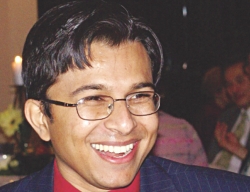 |
|
Photo:Courtesy |
There are very few incredibly talented men out there, particularly in a nation like Bangladesh, who with pride can uphold a positive image of our country in a global picture. Dr Mohidus Samad Khan, with an undergraduate degree in Chemical Engineering from Bangladesh University of Science and Technology (BUET), followed by a PhD from Monash University of Australia and then a Post Doctoral fellowship from McGill University is a personality who has truly made the nation proud and given reasons for the future generation to follow his lead. On his way towards achieving his dreams, Dr Khan, bagged multiple awards, starting with the Monash University Vice-Chancellor's commendation for Doctoral Thesis Excellence also known as, Mollie Holman Doctoral Medal as a recognition of Excellence in PhD Research, Kenneth Hunt Medal from the Monash Engineering Faculty for the Best Engineering PhD Thesis and many other prestigious awards including the Australian national award for the post-graduate researchers working in biotechnology and life science. Additionally, he has also been short listed for the IChemE the Young Engineer of the Year 2010 Award sponsored by GlaxoSmithKline (GSK) and Institute of Chemical Engineers' (IChemE), UK.
For a man of paramount knowledge and ambition, research is just the beginning of a grand ending. Dr Khan's research interests and activities include health and environment related issues which are well connected to Bio-surface Engineering. The benefits of many breakthroughs in biotechnology, medicine and environmental science have been restricted by the high cost and the limited availability of tests and materials. There is a need for low cost bioassays in health and environmental diagnostics. At Monash University, Australia, Dr Khan along with his co-researchers have demonstrated the potential of paper based diagnostics by inventing “instantaneous paper blood typing diagnostics” described in the Analytical Chemistry, a highly reputed journal. There are few blood typing kits available in the market though, which cost around USD$ 10 20. The cost is even higher when blood samples are sent to any pathological labs. However, all these techniques require blood sample collection, preparation and preservation, demanding both trained operators and time. Cheap paper based diagnostics offer an attractive alternative. The manufacturing cost of the paper diagnostics that Dr Khan and his team invented at Monash University is of a few cents per test and can promote health in developing countries. From Monash University, Dr Khan and his research team have patented the concept of blood typing using paper diagnostics. Monash University research team is currently developing the technique to further their work with the industrial partners. The hope is that this invention will result in an inexpensive, reliable paper-based product for instantaneous blood typing. Dr Khan's research work on Bioactive Paper will contribute to the development of low cost disposable diagnostics for biotechnology, health and environmental applications that will offer an opportunity for developing countries like Bangladesh to access basic diagnostics that are too expensive or require highly sophisticated technical supports.
In addition, Dr Khan's bioactive paper research work is highly quoted and highlighted in over 10 countries and 25 journals/organisations including the Royal Society of Chemistry Journal “Chemistry World”, MIT Technology Review, American Chemical Society, NY Times, India Times, and Science Daily.
Dr Khan's family is his greatest inspiration. His father was a researcher in the Bangladesh Council of Scientific and Industrial Research (BCSIR). From a very early age, he was tutored by his father and was always intrigued by the workings of science. He asserts that he always wanted to work on research issues that bring positive impact in the society.
Later, at Monash University, Dr Khan got the necessary environment and resources to dream to touch the sky. In Monash University, his PhD supervisor always encouraged him to think critically and explore new ideas. From McGill, he learned the importance to outthink any research challenge before outdoing it. Both Monash and McGill helped him to understand the importance of research culture and long term vision.
In order to invent, one must struggle, this is a fact of life and Dr Khan was no exception. Working with blood requires specialised laboratory facilities. Dr Khan had such facilities in the Monash Bioengineering Laboratory. This entire research was a time consuming process and setting up collaborations with hospitals to get blood samples for experimental purposes was at times challenging. Arranging volunteers and collecting blood samples from them were also factors of time. For the first round of experiments, Dr Khan himself volunteered as the blood donor for this research project.
Dr Khan's future plan is to do collaborative research in Bangladesh. At present he is running a few undergraduate research projects in Bangladesh in collaboration with faculties from BUET Chemical Engineering Department. His collaborative research projects address environmental and food processing related issues. In future, he expects to do more interactive and collaborative research on cutting edge issues.
Dr Khan having such noble ideas for his country, states that in spite of all the burning issues like corruption, political tension, over population, and limited natural resources, he is optimistic about Bangladesh's future. "It is important to transform our limitations to our strength, for instance by turning our huge population into trained manpower", claims Dr Khan, "Bangladeshi students and professionals have already proven themselves in both national and international levels, but we have a long way to go. In global context, Bangladesh is a young country, and it will take some time to turn into a developed nation". He believes, with proper planning and perseverance as a nation, we can achieve our goals in bigger perspective, but that may not happen in a short time. "As Bangladeshi citizens we have to dream high, remain focus and give our nation its due time", he says.
By Sumaiya Ahsan Bushra
Mashrur Shahid Hossain
Associate Professor and Department Chair
While the number of teachers who take teaching as a money-spinner is on the rise, amidst a growing uproar against the decline in the quality of teaching, it is heartening to learn that a young university teacher has captivated the imaginations of his students and colleagues alike through his extraordinary devotion and commitment to his profession. Creatively engaging with the learners, he unfailingly patronises everything that stands for truth, innovation, and excellence.
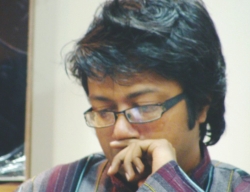 |
|
Photo:Courtesy |
Born in Dhaka, Mashrur Shahid Hossain has, as early as in his mid 30s, emerged as an academic to be reckoned with. Currently an Associate Professor and Chair at the Department of English, Jahangirnagar University, as well as a member of the University Senate, he was also Scholar-in-Residence at the Centre for Contemporary Theory, Baroda, India in 2009. Apart from his notable contributions to the field of literary and cultural criticism, what makes him so special is the incredible amount of passion and energy he employs in making his identity as a teacher truly meaningful. For him, the objectives of education “are not to create zombies but to generate conscious think-tanks, not to curb spontaneous energy and imagination but to excite them, spill them over, so that the work force that is being developed can act, think, laugh, cry, create, answer, frown, question and resolve problems on their own. Education must be meant to develop 'work-and-thought force,' not cyborgs.”
An ardent practitioner of interactive mode of teaching, Mashrur makes sure his classes leave space for discussion, including oppositional ones. In addition to experimentation, he usually teaches courses through 'worksheets,' a guided self-help mechanism, that intends to excite students' imaginations, hone their critical aptitude, help them view things from different perspectives, help them go through the texts with eyes open both to its aesthetic/formal features and socio-political concerns, facilitate students' exposure to inter-textual study as well as relate discursive things to the real life around them. Ask any student from the Department of English, Jahangirnagar University, and you will certainly be flooded with stories of Mashrur's wonderful teaching strategies.
In his academic ventures, Mashrur prefers taking the roads “less travelled by,” quoting Robert Frost, “and that has made all the difference.” With a handful of research and publication on postcolonial literature, theatre, media, and gender in national and international journals and anthologies to his credit, his present focus is on cyber criticism, queer theory, and cultural studies. The last two years saw his works on Instant Messenger, Sufism, Selim Al Deen, Mohammad Rafiq, Islamist pamphleteering in Bangladesh, the re-gazing of masculinity in Bangladeshi fashion discourse, and queer literature. His 2010 essay “dancing like a man, fighting like a woman: querying queering gendering (read: how 'queerity' destabilises gendering)” is arguably the first full-fledged study of queer discourse in the country. However, what makes the difference is how these have heralded a new way of thinking in the department and within the student body. The department syllabuses are increasingly accommodating courses on critical theory, gender, ethnicity, cybernetics, media, and performance studies, leading to what he calls “disciplinary convergence”, something that he argues in one of his articles, the humanities need to adopt in the age of multinational capitalism and virtual colonisation.
As Chair of the Department, he designed an extensive Academic Calendar for the Department in August 2009, the format of which was later adopted by the University. Owing to its successful operation over the last two years, the once session-jam ridden Department is now virtually free of the problem. Under his mature leadership, the Department, in response to the Zubair murder incident, has adopted a strong but non-violent stance that appropriated Gandhian 'civil disobedience' and Che-esque 'la luta continua.' He is presently working on formulating a work plan that may help initiate a student-friendly university culture that ensures safe and pro-study environment, one that respects all views, and counter-views and makes space for healthy extra-curricular activities.
A champion of home-grown culture, Mashrur's initiatives have resulted in annual celebration of Chaitra Shankranti and Pahela Boishakh by the Department of English. He has also initiated students' clubs, graduate seminars and the monthly creative Jalsha. In addition to his increasing participation in literary and cultural events including a BTV programme on language and literature, 'Abinashi Barnamala', he is involved with numerous charity activities.
Already an influential mentor for the young and would-be university teachers, Mashrur Shahid Hossain promises to establish himself not only as a leading scholar of the country but also as a guiding source of inspiration for those who believe in making things happen rather than waiting for them to happen.
By Zahangir Alom